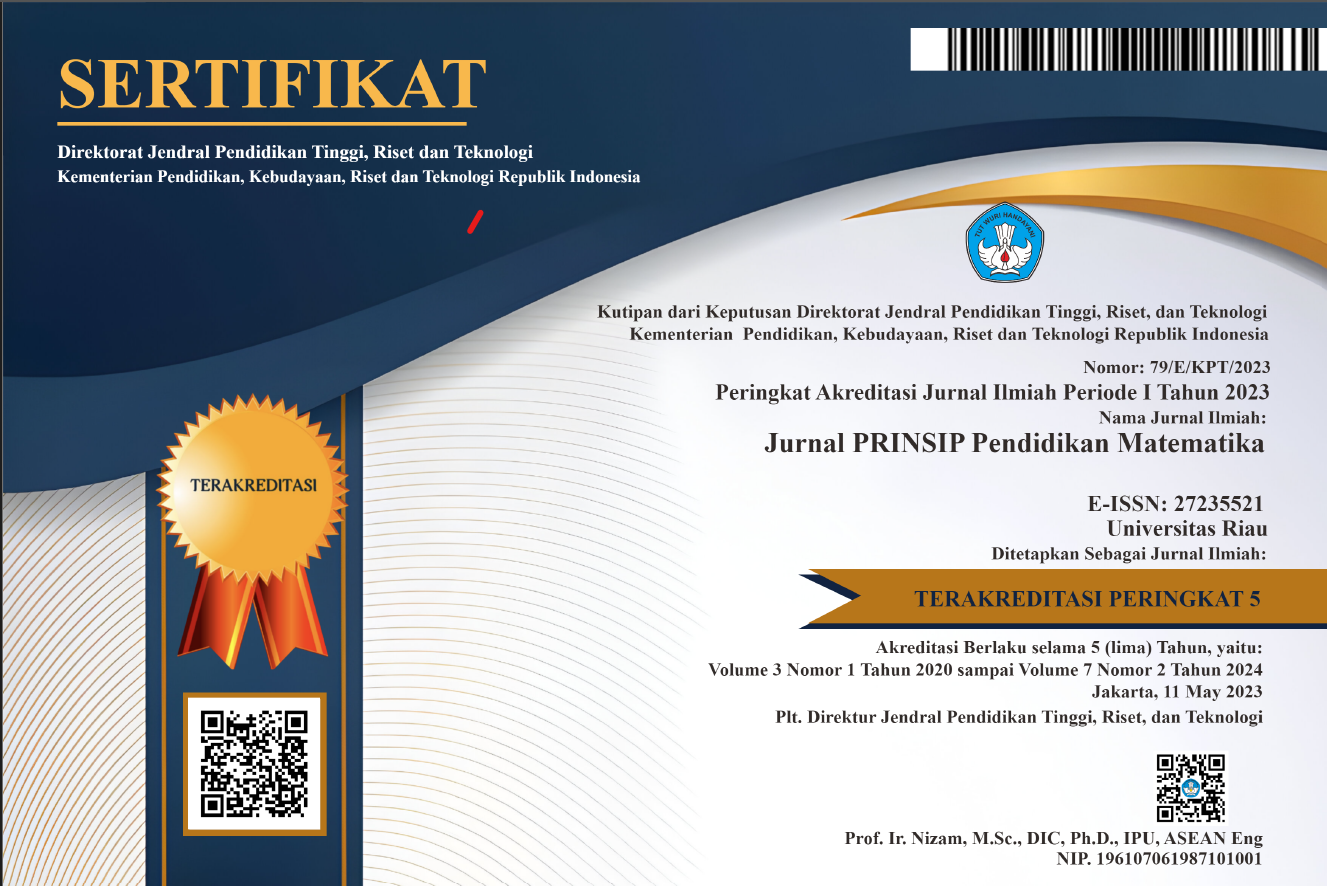THE INFLUENCE OF PARENTING STYLES ON MATHEMATICS LEARNING MOTIVATION IN SEVENTH GRADE STUDENTS IN JUNIOR HIGH SCHOOL
Abstrak
This study aims to determine the influence of paternal parenting styles on the motivation of seventh-grade students to learn mathematics at SMP Negeri 2 Bukittinggi. A correlational research method with an Ex Post Facto approach was employed, involving 156 students with a sample size of 31 individuals. The instrument used was a questionnaire, and data were analyzed using SPSS 17.0. The results indicated a significant influence of paternal parenting styles on students' mathematics learning motivation, reflected in various parenting styles. The regression equation for authoritarian paternal parenting style and mathematics learning motivation was . For the democratic parenting style, it was . The neglectful parenting style yielded , while the permissive style showed . The correlation value obtained was = 0,602 with a coefficient of determination of 36,2404%. Hypothesis testing resulted in a value of 3,298, which was greater than = 1,96 at a 0.05 confidence level, indicating that the hypothesis of a significant influence of paternal parenting on mathematics learning motivation was accepted. This underscores the importance of the father's role in influencing the mathematics learning motivation of seventh-grade students at SMP Negeri 2 Bukittinggi for the academic year 2021/2022.
##plugins.generic.usageStats.downloads##
Referensi
Allen, S., & Daly, K. (2007). The Effect of Father Involvement : An Updated Research Summary of the Evidence. University of Guelph. and Families, Teachers College, Columbia University.
Andayani, B., & Koentjoro. (2014). Psikologi Keluarga: Peran Ayah Menuju Coparenting. Laros.
Arikunto, S. (2016). Prosedur Penelitian Suatu Pendekatan Praktik. Rineka Cipta.
Aryanti, Y. (2017). Peran Ayah Dalam Pengasuhan Anak Usia Dini. Jurnal Pendidikan Dompet Dhuafa, 7(1), 21–24.
Astuti, N. (2022). Systematic Literature Review: Peran Orang Tua Dalam Memotivasi Proses Belajar Siswa di Sekolah Dasar. Jurnal Sarjana Ilmu Pendidikan, 2(2), 116–133.
Ball, J., & Moselle, K. (2007). Fathers’ Contributions to Children’s Well-Being: Father Involvement for Healthy Child Outcomes: Partners Supporting Knowledge Development and Transfer. Public Health Agency of Canada.
Djamarah, S. B. (2014). Pola Asuh Orang Tua dan Komunikasi dalam Keluarga. Rineka Cipta.
Hanum, U. L., Masturi, & Khamdun. (2022). Pola Asuh Orang Tua Terhadap Motivasi Belajar Anak Sekolah Dasar di Desa Bandungrejo Kalinyamatan Jepara. Jurnal Inovasi Penelitian, 2(8), 2443–2450.
Kurnianto, B., & Rahmawati, R. D. (2020). Hubungan Pola Asuh Orang Tua terhadap Motivasi Belajar Siswa Pada Pembelajaran Daring Masa Pandemi. Seminar Pendidikan Nasional (SENDIKA), 2(1), 1–11.
Mulyadi, S., Basuki, A. . H., & Rahardjo, W. (2016). Psikologi Pendidikan Dengan Teori-teori Baru Dalam Psikologi. PT Rajagrafindo Persada.
Sardiman, A. M. (2018). Interaksi dan Motivasi Belajar Mengajar. Rajawali Pers.
Simanullang, A. F., Sipayung, R., & Silaban, P. J. (2020). Pengaruh Pola Asuh Orangtua Terhadap Motivasi Belajar Kelas V SDN 155708 P.O Manduamas 2. Jurnal Educatio FKIP UNMA, 6(2), 219–213. https://doi.org/https://doi.org/10.31949/educatio.v6i2.391
Uno, H. B. (2015). Teori Motivasi dan Pengukurannya: Analisis Dibidang Pendidikan. Bumi Aksara.
Wulandari, A. P., & Renda, N. T. (2020). Hubungan Antara Pola Asuh Orang Tua dengan Motivasi Belajar Matematika Siswa. Jurnal Mimbar Ilmu, 25(2), 251–261. https://doi.org/https://doi.org/10.23887/mi.v25i2.26068
##submission.copyrightStatement##
##submission.license.cc.by-nc-sa4.footer##




